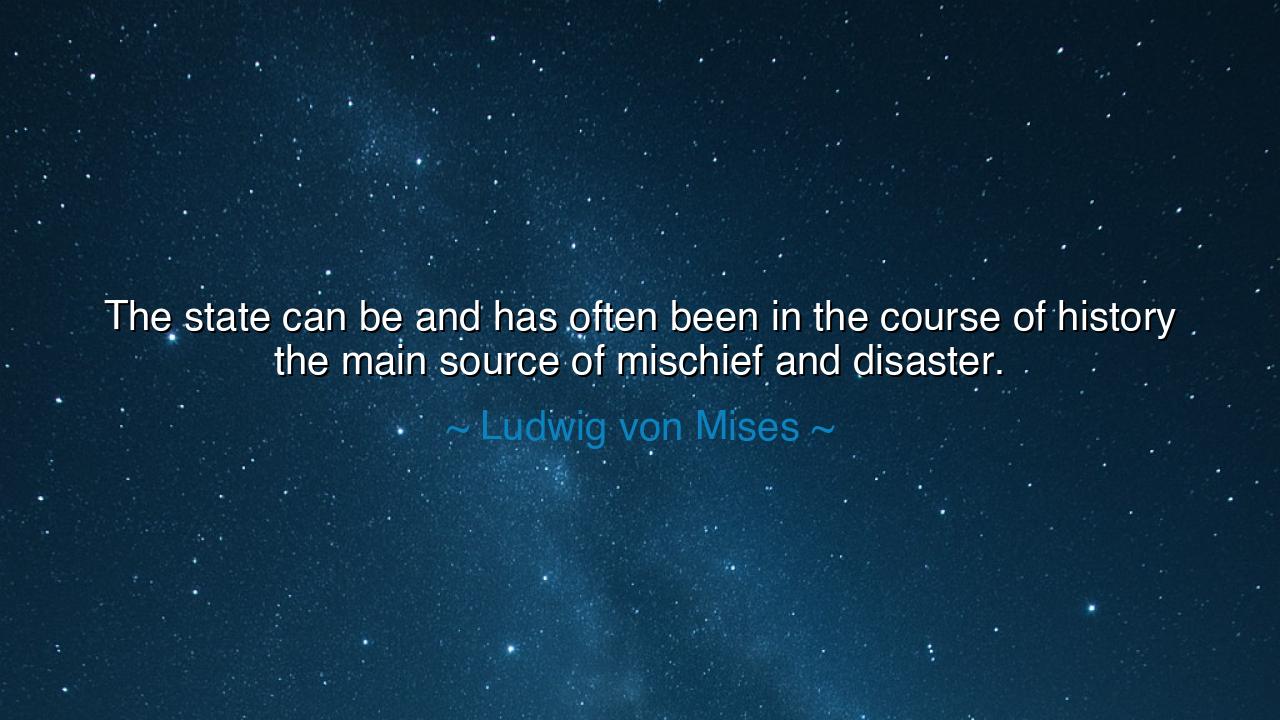
The state can be and has often been in the course of history the
The state can be and has often been in the course of history the main source of mischief and disaster.






“The state can be and has often been in the course of history the main source of mischief and disaster.” So declared Ludwig von Mises, the great economist and philosopher who witnessed the fires of tyranny consume Europe in his lifetime. His words were not born of theory alone, but of suffering observed—of nations that rose in the name of order only to descend into chaos and oppression. He spoke not as a cynic, but as a guardian of freedom, warning future generations that power, when concentrated and unchecked, can turn from protector to predator.
For in its essence, the state is a creation of man—an instrument forged to defend justice, ensure peace, and preserve liberty. Yet, as with all instruments, it can be corrupted by the hand that wields it. Mises saw in the pages of history that when men forget this truth, the state ceases to serve and begins to rule; it ceases to guard life and begins to consume it. What begins as law becomes tyranny, what begins as protection becomes control. And thus, through fear and false righteousness, the very force meant to preserve civilization becomes its undoing.
So it was in the story of the Roman Republic, once a beacon of law and order. Its senators swore oaths to defend liberty, yet over centuries they surrendered that liberty to the promise of safety and spectacle. Power gathered in the hands of emperors, and the republic died not in a single battle, but in a thousand silent concessions. Bread was given to the people, and freedom taken in return. When Caesar crossed the Rubicon, the fate of Rome was sealed—not by swords alone, but by the people's willingness to bow before authority. Thus Mises’s warning finds its ancient echo: that the state, unrestrained by principle, becomes the architect of mischief and disaster.
And in modern times, the lesson repeated itself. The twentieth century saw states rise promising utopia, and instead they birthed gulags, camps, and wars that devoured tens of millions. The totalitarian regimes of Hitler, Stalin, and Mao each proclaimed that they acted for the good of the people. Yet in their wake, they left ashes and silence, proving that when the state declares itself supreme, the individual becomes expendable. Mises, who fled such darkness, understood that no tyranny begins as evil—it begins as order pursued without humility, as authority divorced from conscience.
But his words are not a condemnation of all governance—they are a call for balance and vigilance. The state, like fire, can warm or destroy. It is not the flame itself that is wicked, but the neglect of those who let it grow wild. Freedom, therefore, must be tended as a sacred hearth. Laws must serve the people, not the rulers; and citizens must watch with unblinking eyes, lest the servant once again claim the throne. The health of a nation is measured not by the power of its state, but by the strength of its free and responsible individuals.
Consider the story of Cincinnatus, the Roman farmer called from his plow to save the Republic. He accepted absolute power only to defend his country from peril, and when the danger had passed, he laid down his authority and returned to his fields. His example endures as the ideal ruler—one who wields power not for glory, but for duty, and who relinquishes it when the work is done. Here lies the antidote to the corruption Mises warned of: leadership guided by humility, power bounded by principle.
So, children of the modern age, let these words be a torch for your time. Do not curse the state, but guard against its excess. Do not reject governance, but hold it accountable. Remember that the freedom you enjoy was purchased by those who refused to kneel before authority unearned. Speak when silence is demanded of you, and question when obedience is praised as virtue. For only a vigilant people can prevent the state from becoming a beast that devours its makers.
In the end, Mises’s words are not a cry of despair, but a call to wisdom. They remind us that liberty is not a gift bestowed by rulers—it is a discipline kept by the ruled. The state may often be the source of mischief and disaster, but only when the people surrender their will to question and their courage to resist. Let your mind remain sovereign, your conscience awake, and your love of freedom eternal. For in doing so, you ensure that power serves justice—and not the other way around.






AAdministratorAdministrator
Welcome, honored guests. Please leave a comment, we will respond soon